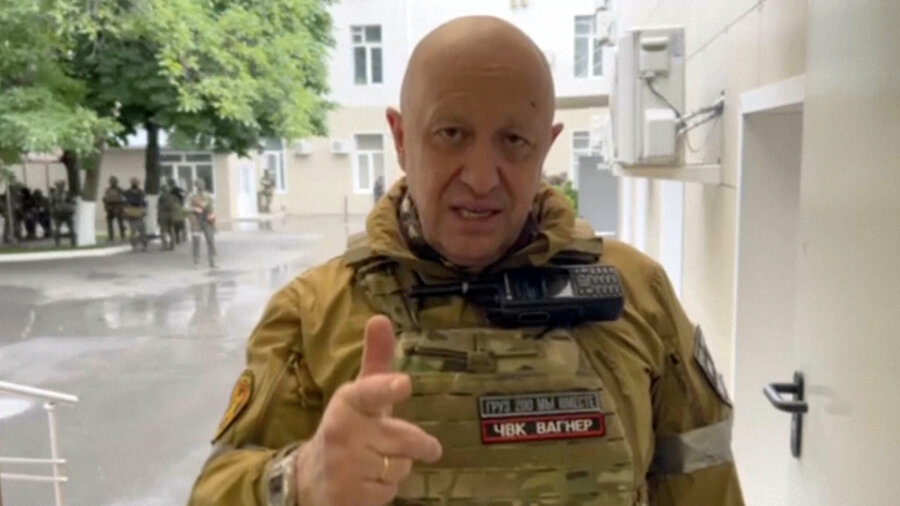Putin met with Prigozhin days after rebellion, Kremlin says
Loading...
Russian President Vladimir Putin hosted mercenary chief Yevgeny Prigozhin at the Kremlin days after the commander led a short-lived rebellion, a senior government spokesman said Monday, the latest twist in a baffling episode that has raised questions about the power and influence held by both men.
The three-hour meeting took place on June 29 and also involved commanders from Mr. Prigozhin’s Wagner Group military contractor, Kremlin spokesman Dmitry Peskov said. Mr. Putin gave an assessment of Wagner’s actions on the battlefield in Ukraine – where the mercenaries have fought alongside Russian troops – and of the revolt itself. The Wagner forces pledged loyalty to Mr. Putin, according to Mr. Peskov.
The confirmation that Mr. Putin met face-to-face with Mr. Prigozhin, who led troops on a march to Moscow last month in order to demand a change of defense minister, was extraordinary. Though Mr. Putin branded Mr. Prigozhin a traitor as the revolt unfolded, the criminal case against the mercenary chief was later dropped and his ultimate fate remains unclear.
Adding to the unusual nature of the meeting was that until very recently, Mr. Putin had denied any link between the state and Mr. Prigozhin’s forces. Though mercenaries are illegal in Russia, Wagner troops have fought for Russian interests around the globe and played a vital role in the capture of Bakhmut in the war’s longest and bloodiest battle.
But throughout the war, Mr. Prigozhin has criticized decisions made by Russia’s top military brass, leading to tensions with the Kremlin that culminated on June 24 in an armed mutiny in which he led his fighters into Russia.
The rebellion severely weakened Mr. Putin’s authority, even though Mr. Prigozhin claimed that the uprising was not aimed at the president but at removing Defense Minister Sergei Shoigu and military chief Gen. Valery Gerasimov. Mr. Prigozhin ended his mutiny after a deal was brokered for him to go to Belarus.
Russia’s Defense Ministry published a video featuring Mr. Gerasimov on Monday – the first time he has been seen since the rebellion.
The twin updates appeared to be another attempt by the Kremlin to show it’s in control after a turbulent period. But many questions remain, including about the deal that ended Mr. Prigozhin’s revolt.
Days after the revolt, Belarusian President Alexander Lukashenko said Mr. Prigozhin was in Belarus. But last week the president said the mercenary chief was in Russia while his troops remained in their camps.
Mr. Peskov said that during the June 29 meeting, Mr. Putin offered an “assessment” of Wagner’s actions on the battlefield in Ukraine and “of the events of June 24.” The president also “listened to the explanations of the commanders and offered them options for further employment and further use in combat,” the Kremlin spokesman said.
“The commanders themselves presented their version of what happened. They underscored that they are staunch supporters and soldiers of the head of state and the commander-in-chief, and also said that they are ready to continue to fight for their homeland,” Mr. Peskov said.
A total of 35 people took part in the meeting, Mr. Peskov said.
Meanwhile, a Russian airstrike on a school in southern Ukraine killed four adults as people gathered to receive humanitarian aid, the governor of Ukraine’s Zaporizhzhia region said Monday, branding the attack “a war crime.”
Three women and a man died in the strike Sunday in the town of Orikhiv, Gov. Yuriy Malashko said.
A guided aerial bomb caused an explosion at the school, Mr. Malashko said, without providing evidence. Eleven other people were wounded in the attack, he said.
Overall, Russia fired on 10 settlements in the province over the course of a day, he said.
Moscow denies it targets civilian locations. Russia has been accused numerous times of doing so and committing other war crimes since its February 2022 invasion of neighboring Ukraine.
In March, the International Criminal Court issued an arrest warrant for Mr. Putin for war crimes, accusing him of personal responsibility for the abductions of children from Ukraine.
Investigations are also underway in Ukraine, Estonia, Latvia, Lithuania, and Poland. The International Center for the Prosecution of the Crime of Aggression against Ukraine, located in The Hague, is helping with those probes.
Zaporizhzhia province is home to Europe’s largest nuclear power plant, which Russian forces seized early in the war, and is one of four regions of Ukraine that Mr. Putin illegally annexed last year. Retaking the province is one of the targets of a Ukrainian counteroffensive.
Russian aerial assaults continued across Ukraine between Sunday and Monday, according to a summary from the Ukrainian presidential office.
In the Donetsk region in the east, the Russians used aircraft, missile systems, and heavy artillery to shell residential areas of 6 cities and villages, injuring one person, the office reported.
The Russian army attacked residential areas of Kherson, the regional capital of a province of the same name. A woman was injured, the presidential office said.
This story was reported by The Associated Press.







